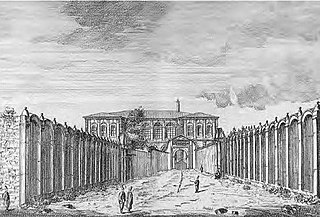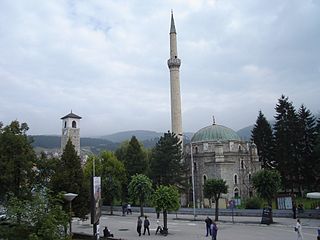See also
- Topol (surname), a Polish/Russian/Jewish surname of different lineage than those of Turkish origin
| Pronunciation | Turkish: [ˈtopaɫ] |
|---|---|
| Origin | |
| Word/name | Turkish |
| Other names | |
| Variant form(s) | Topaloğlu (English: son of Topal) |
Topal is a Turkish word meaning "lame" and may refer to:

Köprülüzade Fazıl Ahmed Pasha was an Ottoman nobleman and statesman, who belonged to the renowned Köprülü family of Albanian origin, which produced six grand viziers of the Ottoman Empire.
Osman Pasha may refer to:
Ali Pasha was the name of numerous Ottoman pashas named Ali. It is most commonly used to refer to Ali Pasha of Ioannina.
Suleiman Pasha may refer to one of the following persons:
Ahmad Pasha or Ahmed Pasha or Ahmet Pasha may refer to:

Topal Osman Pasha (1663–1733) was an Ottoman military officer and administrator. A capable man, he rose to the rank of beylerbey by the age of 24 and served as general against the Venetians and the Habsburg monarchy and as governor in several provinces. His career eventually brought his appointment to the position of Grand Vizier in 1731–32. After his dismissal, he was sent to a provincial governorship, but was soon recalled to lead the Ottoman troops in the Ottoman–Persian War of 1730–35. He succeeded in defeating Nader Shah and saving Baghdad in 1732, but clashed with Nader for a second time the next year and was decisively beaten in the Battle of Kirkuk (1733), in which he lost his life.
Mehmed is the most common Bosnian and Turkish form of the Arabic name Muhammad and gains its significance from being the name of Muhammad, the prophet of Islam. Originally the intermediary vowels in the Arabic Muhammad were completed with an e in adaptation to Turkish phonotactics, which spelled Mehemmed, Mehemed, Mehmed and the name lost the central e over time Final devoicing of d to t is a regular process in Turkish. The prophet himself is referred to in Turkish using the archaic version, Muhammed.
Mehmed Pasha or Mehmet Pasha may refer to:
The Baltacı corps was a palace guard of the Ottoman Empire. It may also refer to:
Semiz Ali Pasha was an Ottoman statesman from the Sanjak of Bosnia who served as Grand Vizier of the Ottoman Empire from 1561 to 1565. He was the beylerbey (governor) of Egypt Eyalet from 1549 to 1553. Semiz Ali Pasha was born in Prača in Bosnia, and replaced Rüstem Pasha as a Grand Vizier. After palace schooling, he discharged high-level functions along the Ottoman Empire. His epithet "Semiz" means "fat" in Turkish.
Derviş Mehmed Pasha, an Ottoman Bosnian statesman, served briefly as the Grand Vizier of the Ottoman Empire between 21 June 1606 and 9 December 1606.

Lütfi Pasha was an Ottoman Albanian statesman, general, and Grand Vizier of the Ottoman Empire under Suleiman the Magnificent from 1539 to 1541. He wrote 21 works mainly on religious topics but also on history, 13 of them written in Arabic and eight in Turkish. Two of his works are the Asafname, a kind of mirror for ministers, and the Tevâriḫ-i Âl-i ‘Os̱mân, dealing with Ottoman history and including his own experiences in the reign of the sultans Bayezid II, Selim I and Suleyman I.

Halil Hamid Pasha, also Khaleel Hameed Basha (1736–1785) was the grand vizier of the Ottoman Empire from 31 December 1782 to 30 April 1785. He was of Bosnian origin. He was especially instrumental in inviting foreign experts, especially French ones, to the Ottoman Empire from 1784.
Topal Recep Pasha was an Ottoman statesman from the Sanjak of Bosnia, as well as Damat ("bridegroom") to the House of Osman. He served as the Grand Vizier of the Ottoman Empire from 10 February 1632 to 18 May 1632. He was instrumental in lynching the former grand vizier, Hafiz Ahmed Pasha. When his brother-in-law Sultan Murad IV realized this, he had Recep Pasha executed on 18 May 1632 in Constantinople.

Mehmed Rushdi Pasha was an Ottoman reformist and statesman. He served as Grand Vizier of the Ottoman Empire during five separate terms. He was preceded by Midhat Pasha. Mehmed Rushdi Pasha was a fervent supporter of the Tanzimat. He believed that the empire would lag behind the West if no attempt was made to modernize itself. He served as a Translator of Military texts as well as a military colonel in his youth. He was born in 1811, and died on 27 March 1882.
Sokullu is a Turkish surname. Notable people with the surname include:

Husein Paša Boljanić was an Ottoman statesman and government official who served many high-level positions in the Ottoman Empire, including governorship of Bosnia (1594–95), of Damascus (1582–83), of Diyarbekir, of Budin, of Aleppo, of Van, of Anatolia, and of Egypt (1573–74).
Osman-pasha the Bosnian or the Herzegovinian, known as Osman-paša Kazanac, was an Ottoman statesman who served as the governor of the Damascus Eyalet, of Anatolia Eyalet (1678–1680), of Egypt Eyalet (1680–1683), of Diyarbekir Eyalet (1683), of Bosnia Eyalet (1684), and of Eğri Eyalet (1685). His byname suggests that he hailed from the Sanjak of Bosnia or the Sanjak of Herzegovina.
The Serbs in Turkey are Turkish citizens of Serbian descent or Serbia-born people who reside in Turkey.
Hersekli, meaning "of Herzegovina" or "Herzegovinian" in Turkish, relating to the Ottoman Sanjak of Herzegovina, was an epithet used for Ottoman nobility. It may refer to: